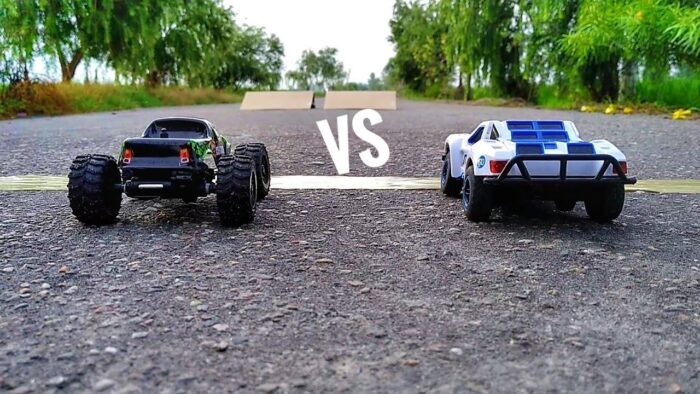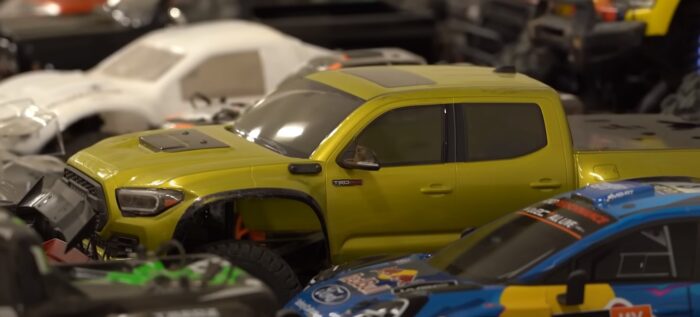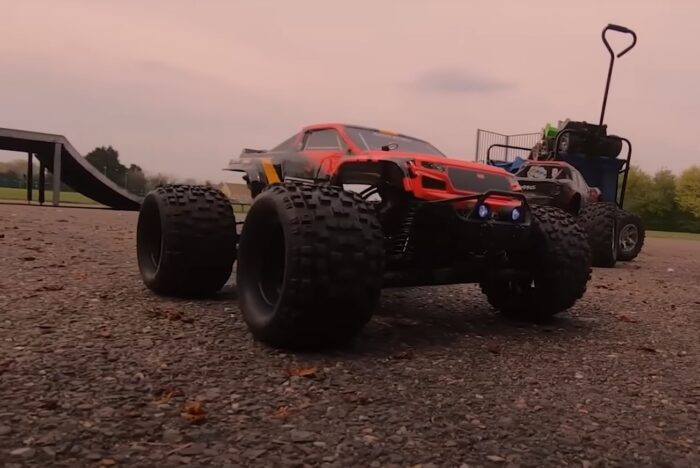A slot car is my choice, but that doesn’t mean I do not enjoy RC racing.
I used to participate in these races quite often in the past, but not as much these days due to a lack of time.
While I would never switch from slot to RC, I can see the appeal individuals can see in it.
Today, I will address the major differences between these so that readers can have a much better idea about them.
Table of Contents
Pros and Cons
Before I start talking about details, I just want to outline the major pros and cons of both concepts.
Slot Cars
- Easy to set up and use, making them beginner-friendly.
- Lower initial and maintenance costs.
- Suitable for indoor use and limited spaces.
- Family-friendly community and events.
- Limited movement and customization options.
- Performance is restricted by track design.
- Less immersive for those seeking technical challenges.
RC Cars
- High degree of customization and performance tuning.
- Versatile racing environments, both indoor and outdoor.
- Engaging and active community with frequent competitions.
- Immersive hobby for enthusiasts interested in technical aspects.
- Higher initial investment and ongoing costs.
- More complex setup and maintenance.
- Requires more space, often necessitating outdoor use.
Accessibility and Setup
Let’s go next with accessibility and setup.
Slot Cars
Slot cars are generally more accessible and easier to set up, making them a popular choice for beginners and families.
These miniature vehicles run on a fixed track with grooves or “slots,” ensuring they stay on course, which simplifies the racing experience.
Setting up a slot car track is straightforward, often involving snapping together pieces of track and connecting a power source.
This ease of setup makes slot cars ideal for home use, where space might be limited.
Many community centers and hobby shops host slot car tracks, providing accessible venues for racing and socializing with other enthusiasts.
The simplicity of slot cars appeals to those looking for a hassle-free, ready-to-go racing experience without extensive preparation.
RC Cars
RC cars, on the other hand, require more space and are typically used outdoors or in large indoor areas.
These vehicles are controlled remotely, offering more freedom of movement and a dynamic racing experience.
The initial setup of RC cars can be complex, often involving assembling parts, configuring the remote control, and ensuring proper battery or fuel management.
The entry cost is higher due to the need for a robust remote control system, batteries, and possibly fuel for nitro-powered models.
Despite the complexity, the flexibility and performance capabilities of RC cars attract hobbyists who enjoy hands-on setup and customization.
Cost Comparison
When comparing costs, slot cars generally have a lower initial investment.
A basic slot car set, including the track, cars, and controller, can be purchased at a relatively affordable price. Maintenance costs are also lower, as the cars are simpler in design with fewer components that can break or wear out.
Slot car tracks are durable, and replacement parts are inexpensive, making it a cost-effective hobby over time.
RC cars, conversely, come with higher initial and ongoing costs.
Purchasing a quality RC car can be significantly more expensive, especially if opting for advanced models with superior performance features.
RC cars require regular maintenance, including battery replacements, tire changes, and possible repairs to the motor or chassis. Nitro-powered RC cars also incur costs for fuel and more intensive maintenance.
Customization and upgrades, while enhancing performance, further add to the expenses.
The investment in RC cars can be justified by the advanced features, greater performance capabilities, and the depth of engagement the hobby offers.
Performance and Customization
Performance, as well as customization, is the next subject that should be addressed in greater detail.
Slot Cars
Slot cars have performance limitations dictated by their track and car design. These are guided by slots, restricting their movement to the track’s layout.
While this ensures smooth racing, it limits the customization of driving techniques.
Customization in slot cars is mainly aesthetic, involving changes to the car’s body, paint job, and decals.
Performance tuning is minimal, typically limited to adjusting weights or upgrading the motor for slightly better speed.
The standardized nature of slot cars simplifies the hobby but offers limited scope for technical modifications and performance enhancements.
RC Cars
RC cars excel in customization and performance, offering a high degree of personalization from engines to suspension systems.
Enthusiasts can modify almost every aspect of an RC car, including the motor, tires, suspension, and body.
These modifications significantly influence the car’s performance, handling, and speed, allowing hobbyists to tailor their vehicles to specific racing conditions or personal preferences.
RC cars’ performance is governed by real-world vehicle dynamics, making them more complex and engaging for those interested in automotive engineering.
The level of customization and performance tuning provides a deeply immersive experience, attracting enthusiasts who enjoy technical challenges and continuous improvement.
Racing Venues and Community
The final major factor that requires discussion is racing venues and community impact.
Slot Cars
Slot car racing primarily takes place on indoor tracks, making it suitable for community centers, hobby shops, or private homes.
These venues often host competitive leagues and casual racing events, fostering a sense of community among enthusiasts.
The controlled environment of indoor tracks ensures consistent racing conditions and allows for organized competitions.
Slot car communities are typically family-friendly, with events catering to all age groups, making it a great activity for family bonding.
The communal aspect of slot car racing, with shared tracks and regular meetups, helps build lasting relationships among participants.
RC Cars
RC car racing offers versatility in racing environments, accommodating both indoor and outdoor venues.
Outdoor tracks can vary from dirt courses to paved circuits, providing diverse racing experiences.
The versatility allows RC car enthusiasts to enjoy racing in different settings, from local parks to dedicated RC tracks.
The larger and more active RC car community engages in frequent competitions, events, and social gatherings, creating a vibrant and dynamic community.
Enthusiasts often travel to participate in regional and national events, enhancing the sense of camaraderie and competition.
The broader community and variety of racing environments make RC car racing an engaging and socially rewarding hobby.



